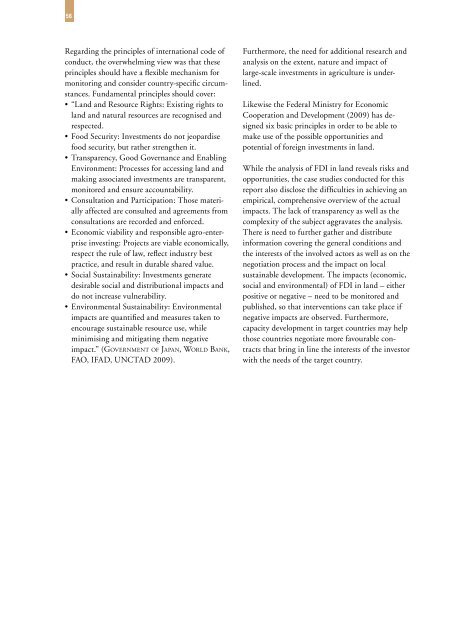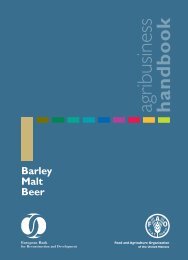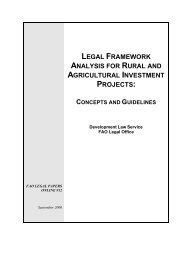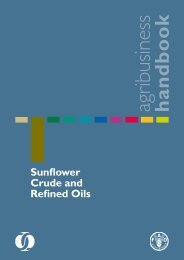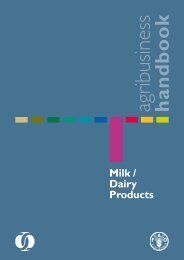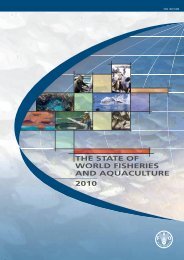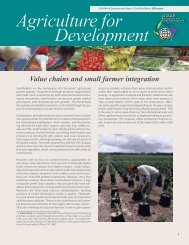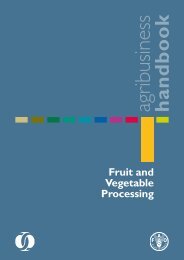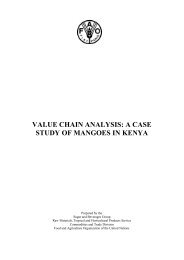Foreign Direct Investment (FDI) in Land in developing countries
Foreign Direct Investment (FDI) in Land in developing countries
Foreign Direct Investment (FDI) in Land in developing countries
- No tags were found...
Create successful ePaper yourself
Turn your PDF publications into a flip-book with our unique Google optimized e-Paper software.
56Regard<strong>in</strong>g the pr<strong>in</strong>ciples of <strong>in</strong>ternational code ofconduct, the overwhelm<strong>in</strong>g view was that thesepr<strong>in</strong>ciples should have a flexible mechanism formonitor<strong>in</strong>g and consider country-specific circumstances.Fundamental pr<strong>in</strong>ciples should cover:• “<strong>Land</strong> and Resource Rights: Exist<strong>in</strong>g rights toland and natural resources are recognised andrespected.• Food Security: <strong>Investment</strong>s do not jeopardisefood security, but rather strengthen it.• Transparency, Good Governance and Enabl<strong>in</strong>gEnvironment: Processes for access<strong>in</strong>g land andmak<strong>in</strong>g associated <strong>in</strong>vestments are transparent,monitored and ensure accountability.• Consultation and Participation: Those materiallyaffected are consulted and agreements fromconsultations are recorded and enforced.• Economic viability and responsible agro-enterprise<strong>in</strong>vest<strong>in</strong>g: Projects are viable economically,respect the rule of law, reflect <strong>in</strong>dustry bestpractice, and result <strong>in</strong> durable shared value.• Social Susta<strong>in</strong>ability: <strong>Investment</strong>s generatedesirable social and distributional impacts anddo not <strong>in</strong>crease vulnerability.• Environmental Susta<strong>in</strong>ability: Environmentalimpacts are quantified and measures taken toencourage susta<strong>in</strong>able resource use, whilem<strong>in</strong>imis<strong>in</strong>g and mitigat<strong>in</strong>g them negativeimpact.” (Government of Japan, World Bank,FAO, IFAD, UNCTAD 2009).Furthermore, the need for additional research andanalysis on the extent, nature and impact oflarge-scale <strong>in</strong>vestments <strong>in</strong> agriculture is underl<strong>in</strong>ed.Likewise the Federal M<strong>in</strong>istry for EconomicCooperation and Development (2009) has designedsix basic pr<strong>in</strong>ciples <strong>in</strong> order to be able tomake use of the possible opportunities andpotential of foreign <strong>in</strong>vestments <strong>in</strong> land.While the analysis of <strong>FDI</strong> <strong>in</strong> land reveals risks andopportunities, the case studies conducted for thisreport also disclose the difficulties <strong>in</strong> achiev<strong>in</strong>g anempirical, comprehensive overview of the actualimpacts. The lack of transparency as well as thecomplexity of the subject aggravates the analysis.There is need to further gather and distribute<strong>in</strong>formation cover<strong>in</strong>g the general conditions andthe <strong>in</strong>terests of the <strong>in</strong>volved actors as well as on thenegotiation process and the impact on localsusta<strong>in</strong>able development. The impacts (economic,social and environmental) of <strong>FDI</strong> <strong>in</strong> land – eitherpositive or negative – need to be monitored andpublished, so that <strong>in</strong>terventions can take place ifnegative impacts are observed. Furthermore,capacity development <strong>in</strong> target <strong>countries</strong> may helpthose <strong>countries</strong> negotiate more favourable contractsthat br<strong>in</strong>g <strong>in</strong> l<strong>in</strong>e the <strong>in</strong>terests of the <strong>in</strong>vestorwith the needs of the target country.


